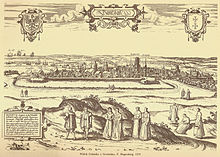Danzig war
The Gdansk War was an internal armed conflict between the city of Gdansk and the Polish royal power from 1576 to 1577.
prehistory
After the elected French-born King Heinrich von Valois fled Poland in June 1574, a new election took place on the Election Day in late autumn 1575. While the Szlachta elected Stefan Bathory , who had been Prince of Transylvania since 1571, as the future king , the Interrex proclaimed Jakub Uchański with the support of the Senate on December 12, 1575, from Emperor Maximilian II . The double election was decided by Stefan reaching for the crown more quickly, who arrived at the Moldovan border at the end of March, while the emperor first took the oath on the pacta conventa . Due to the early death of the emperor on October 12, 1576, the transition of the Habsburgs' supporters to Stefan's side was made much easier.
The city of Danzig wanted to declare itself for Maximilian even after Stefan's coronation and refused the homage already paid by the other Prussian estates .
course
The resistance of the heavily fortified city could not be broken by a subsequent three-month siege of the city from June to September 1577 despite the defeat of a Danzig civil army in the battle of Dirschau in April 1577 . The opposing forces, which included Hungarian troops under Bathory's former rival to the throne Gáspár Bekes , did not succeed in cutting off the city from the seaside, so that Danzig could receive naval support from Denmark. After the siege was broken off, the Danzigers were able to take offensive action against Elbing, which was supported by the Polish king .
peace
Under the mediation of Brandenburg, both sides concluded a peace in December 1577, which was only a formal success for the king. Gdansk recognized the election only on the condition that the Karnkowski Statute was abolished and Gdansk confirmed all privileges and suffered no punishment. Seven years later, in the stake money contract of February 26, 1585 , Danzig achieved such extensive privileges that its position at the mouth of the Vistula was comparable to that of one of the Hanseatic Free Cities in the Holy Roman Empire .
literature
- Theodor Schieder, André J. Bourde, Josef Engel (eds.): The emergence of modern Europe (= Handbook of European History . Vol. 3), Klett, Stuttgart 1971, ISBN 978-3-12-907550-0 , p. 1035f.
